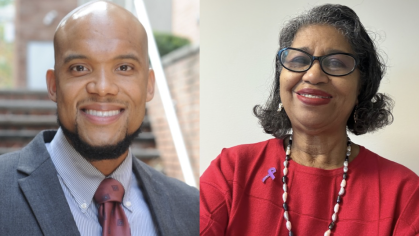Adrian Gale is an assistant professor at Rutgers School of Social Work within the Child Welfare and Well-Being Research Unit. Dr. Gale’s current research seeks to understand how Black youth’s schooling experiences in general, and Black boys’ experiences in particular, contribute to the achievement gap. With MSW and PhD degrees from the University of Michigan, Dr. Gale takes a transactional perspective when examining this gap in educational opportunities and in identifying ways to close it.
Dr. Gale gives a glimpse into some of the research relating to Inclusion, Intersectionality, Diversity, Equity and Advancement (IIDEA) which he recently conducted.
Tell us about one specific article or dissemination effort that relates to IIDEA that you’ve worked on recently.
My scholarship examines factors contributing to Black boys’ academic success and educational attainment. Educational attainment, such as earning a college degree, is a vital predictor of critical life outcomes (social life, physical health, and economic prospects). I recently submitted an article, “A Review of School-based Interventions for Black Boys’ School Success,” that reviews prior empirical studies on school-based interventions and supports for Black boys' educational attainment. Systematic reviews like this are an excellent way to synthesize research on a specific issue and identify common themes.
Why did you conduct this study/dissemination effort?
This systematic review has professional and personal relevance for me. First, it advances my program of research on Black adolescents by focusing on Black boys, a group known to perform less well academically than their peers. Second, as a Black male educator and a father of Black children, I am also personally invested in supporting the success of Black youth. Black boys are often viewed as problems that need to be solved and not as people possessing potential yet to be unlocked.
How does it connect with the principles of IIDEA?
The findings of my review point to the importance of cultural competence for Black boys’ educational attainment. This review of literature on published research findings for successful school-based interventions for Black boys highlighted the fact that active engagement among Black boys through personal and cultural relevance to these boys’ lives is pivotal. Specifically, cultural relevance, which refers to the ability to cater to the social and cultural needs and norms of racially and ethnically diverse individuals, implicates the principles of diversity and inclusion. When Black boys feel valued and supported, they achieve at higher levels.
What are the implications of your work for social policy, practice, or research?
My work is relevant to social work practice and research. The research findings from this review can inform future interventions and programs designed to improve Black boys’ educational achievement. Intervention research advances our knowledge about the process of change and growth in Black boys. Thus, while educational interventions can be effective for Black boys, these programs may also help schools develop ways to help all students.
What is the value of this work? Why is it important?
Although Black boys trail behind their peers in many areas, it is important that we do not overlook the potential they possess. It is our duty as social workers and as a society at large to ensure that all citizens have the opportunity to maximize their educational potential. By gaining a greater understanding of factors that support educational success for Black boys, my work will address a critical social ill. Lastly, while interventions and supports for Black boys are crucial, social workers must continue challenging systemic issues (e.g. economic inequality) that limit Black boys’ educational opportunities.
This story was created in partnership with Rutgers School of Social Work's Inclusion, Intersectionality, Diversity, Equity, and Advancement (IIDEA) Committee in support of our commitment to diversity, equity, and inclusion.



